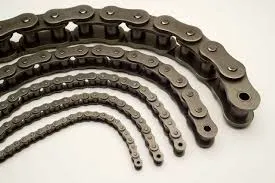
The Complete Guide to Industrial Chains: Types, Applications, and Maintenance
An industrial chain is a critical component in many machinery systems, designed to transmit power efficiently and reliably. From manufacturing plants to heavy machinery, industrial chains are essential for ensuring smooth operations and minimizing downtime. Understanding their types, applications, and maintenance can help businesses enhance performance and reduce operational costs.
What is an Industrial Chain?
An industrial chain is a mechanical assembly consisting of interconnected links used to transmit power from one sprocket to another. Unlike other transmission systems, industrial chains can handle high loads, reduce slippage, and maintain efficiency in demanding environments. They are widely used in conveyors, production lines, and heavy equipment.
Types of Industrial Chains
There are several types of industrial chains, each suited for specific applications:
Roller Chains – Commonly used for power transmission in machinery, offering durability and efficiency.
Conveyor Chains – Designed to move materials smoothly along production lines.
Leaf Chains – Ideal for lifting applications, such as in forklifts or hoists.
Double Pitch Chains – Used for applications requiring longer link spacing and reduced weight.
Selecting the right industrial chain is essential to ensure optimal performance and longevity.
Applications of Industrial Chains
Industrial chains are used across a variety of industries, including:
Manufacturing: For conveyor systems, assembly lines, and machinery.
Agriculture: In harvesters, tractors, and other farm equipment.
Construction: For cranes, lifts, and heavy machinery.
Automotive: In engine timing, power transmission, and other mechanical systems.
Using a high-quality industrial chain can improve efficiency, reduce wear on machinery, and minimize maintenance costs.
Maintenance Tips for Industrial Chains
Proper care is essential for extending the life of an industrial chain:
Lubrication: Regularly apply suitable lubricants to minimize friction and wear.
Inspection: Check for stretching, corrosion, or damaged links.
Cleaning: Remove dust, debris, and contaminants to prevent damage.
Alignment: Ensure sprockets are properly aligned to avoid uneven wear.
Routine maintenance not only extends the life of your industrial chain but also ensures consistent performance and safety.
Benefits of Using High-Quality Industrial Chains
Investing in reliable industrial chains offers several advantages:
Enhanced durability and resistance to wear
Efficient and smooth power transmission
Reduced downtime and lower maintenance costs
Increased safety in industrial operations
Poor-quality chains can lead to frequent breakdowns and higher operational expenses. Choosing trusted suppliers ensures your industrial chain meets industry standards and performs consistently under demanding conditions.
